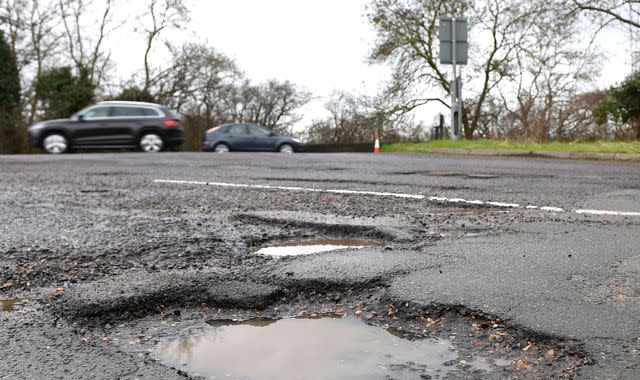Cost of fixing potholes soars since invasion of Ukraine

Councils are facing unprecedented costs to fix potholes due to a shortage of material caused by Russia's war in Ukraine.
Local authorities were already facing a significant road repair backlog, with latest estimates stating it would take them 10 years and £12bn to bring all surfaces up to scratch.
New analysis from the cross-party Local Government Association (LGA) found many councils across England and Wales have been hit by a 22% spike in the cost of road maintenance since the war escalated.
Inflation could top 22% next year - Cost of living latest
Before the invasion in February, around 60% of bitumen - a material used to repair roads across the UK - was sourced from Russia.
Councils now have to ration bitumen and find it from other markets, pushing up costs and delaying vital road repairs.
Spiralling energy costs and inflation also mean there has been a 38% increase in the bill for running and repairing street lights over the past six months.
Some authorities report that their costs in these areas have doubled, the LGA said.
David Renard, the organisation's transport spokesperson, said global pressures have created a "perfect storm" for councils on already stretched budgets.
"As this stark new analysis shows, councils across the country are facing unprecedented increased costs to repair our local roads, keep our street lights switched on and invest in improved local infrastructure," he said.
"Global pressures, such as Russia's invasion of Ukraine, as well as increasing inflation and a shortage of materials, have all provided the perfect storm for councils and piled pressure on already stretched local budgets."
He called on the successor to Boris Johnson - who will be announced next week - to cover the increased costs for councils or risk road conditions getting worse and services being reduced.
Read more:
France has capped energy price rises at 4% - could UK do the same?
UK consumers borrow on credit cards at fastest rate since 2005
Steve Gooding, director of the RAC Foundation, said that a new long-term solution was needed "that doesn't risk road spending being perennially crowded out by authorities' social care responsibilities".
He said: "Patching potholes might pale into insignificance as a problem when compared to the devastation and human misery caused by President Putin's actions, but the funding squeeze on local spending will soon start to feel more real if authorities are going to struggle just to keep the street lights on."
The LGA also found that councils' capital budgets, which support the building of new roads and other local infrastructure, have had an estimated rise of 21%, pushing up the cost of delivering investment in local areas.
The analysis was based on a survey of its members and current prices.
Previous LGA analysis published in June showed that councils are facing £3.6bn of unforeseen extra cost pressures to their budgets in 2024/25 due to rising energy prices, spiralling inflation, and national living wage pressures.
The organisation warned that the impact of inflation on local services would be "disastrous" without adequate long-term funding and more powers for councils to make local decisions.

 Yahoo News
Yahoo News 
